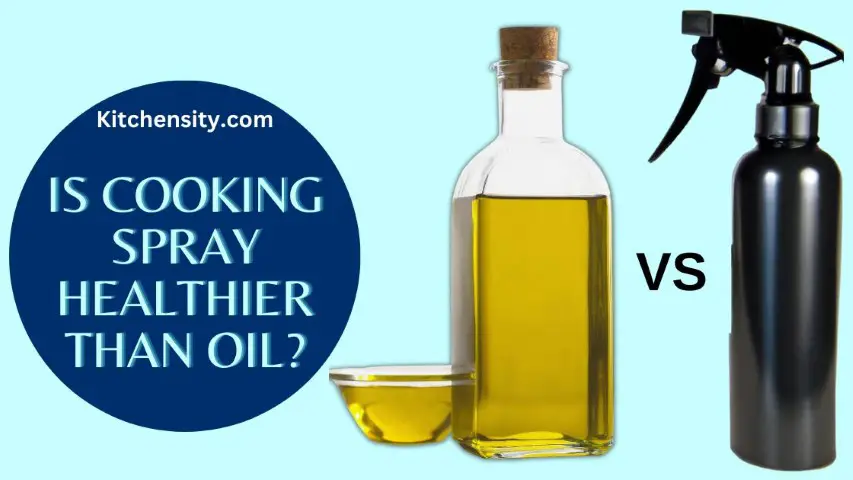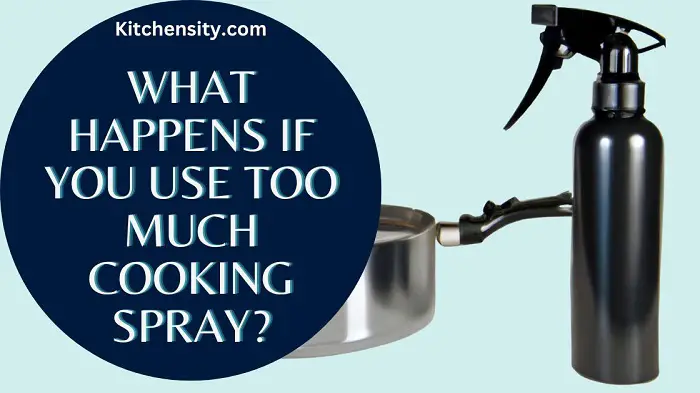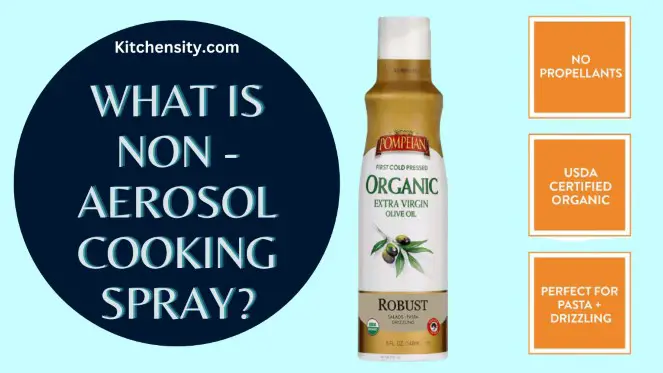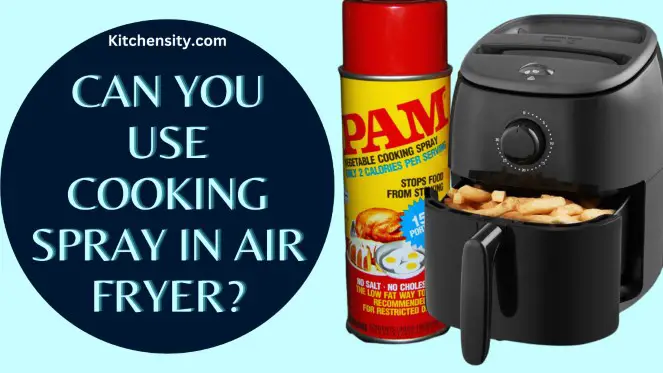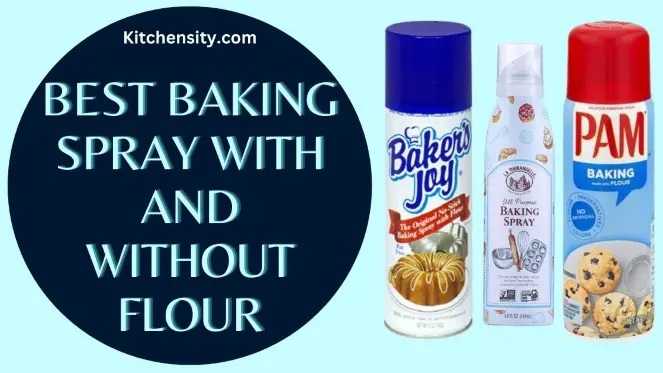Cooking spray is a common kitchen ingredient that is used to prevent food from sticking to pans and baking dishes, but it’s not always a pantry staple.
Fortunately, there are plenty of alternatives to cooking spray that you can use to achieve similar results in your cooking.
In this article, we will discuss some of the best substitutes for cooking spray that you can find in your home.
![What Can I Use Instead Of Cooking Spray? [10 Best Substitutes] 1 substitutes for cooking spray](https://www.kitchensity.com/wp-content/uploads/2023/04/What-Can-I-Use-Instead-Of-Cooking-Spray.jpg)
Table of Contents
- 1 Is Cooking Spray Necessary?
- 2 Best Substitutes For Cooking Spray
- 3 How To Grease A Pan Without Spray or Spray Oil Without A Sprayer?
- 4 Why Avoid Cooking Spray?
- 5 YOU MAY ALSO LIKE
- 6 Conclusion
- 7 FAQs
- 7.1 Can I Use Cooking Spray On Non-Stick Cookware?
- 7.2 Is Cooking Spray Unhealthy?
- 7.3 What Can I Use Instead Of Parchment Paper?
- 7.4 Can I Make My Own Cooking Spray?
- 7.5 Can I Use Flour Instead Of Cooking Spray?
- 7.6 Can I Use Butter Instead Of Cooking Spray
- 7.7 What Are Alternatives To Cooking Spray?
- 7.8 Can You Use Vegetable Oil Or Olive Oil Instead Of Baking Spray?
- 7.9 Is Cooking Spray Just Olive Oil?
- 7.10 Can You Use Water Instead Of Cooking Spray?
Is Cooking Spray Necessary?
Cooking spray is not necessary for cooking or baking, but it can be a helpful tool to have in your kitchen.
It can be used to prevent food from sticking to pans or baking dishes, making cleanup easier and helping to preserve the appearance of your food.
However, there are alternative methods that can be used in place of cooking spray, such as brushing oil or butter onto your pans or using parchment paper.
It ultimately comes down to personal preference and what works best for your cooking style and the specific recipe you are making.
Best Substitutes For Cooking Spray
1. Oil or Butter
One of the most common substitutes for cooking spray is oil or butter. You can use any type of oil, such as olive oil, vegetable oil, or coconut oil, to grease your pans and baking dishes.
Simply use a paper towel or a brush to spread the oil evenly over the pan’s surface. You can also use butter or margarine, which will give your food a delicious flavor.
2. Parchment Paper
Parchment paper is another excellent substitute for cooking spray. It is a non-stick paper that is used in baking and cooking to prevent food from sticking to the pan.
You can use parchment paper to line your baking sheets, cake pans, and even your frying pans. Simply place the parchment paper over the surface of the pan and then add your food on top of it.
3. Silicone Baking Mats
Silicone baking mats are another excellent substitute for cooking spray. They are non-stick mats that can be placed directly on your baking sheet or pan.
They are heat-resistant and can withstand high temperatures, making them perfect for baking and roasting.
4. Cooking Oil Spritzer
A cooking oil spritzer is a handy kitchen gadget that can be used to spray oil evenly over your pans and baking dishes.
It works by using a pump to create pressure that sprays the oil onto your cooking surface. You can use any type of oil in a spritzer, making it a versatile substitute for cooking spray.
5. Baking Brush
A baking brush is another simple tool that you can use to grease your pans and baking dishes. Simply dip the brush into oil or butter and then brush it evenly over the surface of the pan.
This method is ideal for basting your meats or vegetables while cooking, and for brushing egg wash or melted butter onto your baked goods.
Baking brushes come in different sizes and materials, such as silicone and natural bristle, so you can choose the one that suits your needs.
It’s important to note that if you’re using a natural bristle brush, it may retain some of the flavors and aromas of the foods you’ve cooked before, so it’s best to use different brushes for different types of foods.
6. Non-Stick Cookware
If you have non-stick cookware, you may not need to use the cooking spray at all. Non-stick pans and pots are designed to be naturally non-stick, so you can use them without any additional greasing.
However, it’s important to note that non-stick cookware can release harmful chemicals when overheated, so be sure to use it properly.
7. Homemade Cooking Spray
You can also make your cooking spray at home using ingredients you probably already have in your pantry.
To make a homemade cooking spray, mix equal parts of oil and water in a spray bottle and shake well to combine.
You can use any type of oil, such as olive oil, vegetable oil, or canola oil, depending on your preference.
8. Flour or Cornstarch
If you’re baking, you can use flour or cornstarch to prevent your baked goods from sticking to the pan.
Simply dust the surface of the pan with flour or cornstarch before adding your batter or dough. This method works particularly well for bread, pizza, and pastry dough.
9. Vinegar and Water
If you’re cooking on a non-stick pan and don’t want to add any additional oil or butter, you can use a mixture of vinegar and water to prevent sticking.
Simply mix equal parts of white vinegar and water in a spray bottle and spray the surface of the pan before adding your food.
10. Egg Wash
If you’re making baked goods such as pies or pastries, you can use an egg wash to prevent sticking.
An egg wash is simply a mixture of beaten egg and water or milk that is brushed onto the surface of the dough before baking.
The egg will help the dough brown and crisp up, while also preventing it from sticking to the pan.
How To Grease A Pan Without Spray or Spray Oil Without A Sprayer?
If you don’t have cooking spray, there are several alternative methods for greasing a pan or spraying oil without a sprayer. Here are some options:
- Brushing with oil: Using a pastry brush or a paper towel, brush your pan with a thin layer of vegetable oil, coconut oil, or melted butter.
- Butter and flour: Rub softened butter onto the surface of the pan, then dust with flour, shaking out the excess.
- Parchment paper: Line the bottom of your pan with a piece of parchment paper, then grease the parchment paper using one of the methods above.
- Non-stick baking mat: Use a non-stick baking mat, such as a silicone mat, in place of greasing your pan.
- Use a mister bottle: Fill a clean spray bottle with your preferred oil, then use it to mist your food or cooking surface.
- Use a pump spray bottle: Fill a pump spray bottle with your preferred oil, then pump the top to create a spray.
Remember, the goal is to create a thin, even layer of fat to prevent your food from sticking, and also, use only a small amount of oil when spraying to avoid over-saturating your food or cooking surface.
It may take some practice to find the method that works best for you, but with a bit of creativity, you can achieve perfectly greased pans without cooking spray.
Why Avoid Cooking Spray?
There are several reasons why you may want to avoid using cooking spray.
- First, some cooking sprays contain questionable ingredients such as propellants, emulsifiers, and anti-foaming agents that may not be healthy to consume.
- Second, cooking spray can be expensive, and you may not want to keep it on hand all the time.
- Finally, cooking spray may not be suitable for all types of cooking, such as high-heat cooking, and may leave a residue that is difficult to clean.
YOU MAY ALSO LIKE
- Best Cooking Sprays For Eggs
- Best Cooking Sprays For Gas Grills
- Kirkland Canola Oil Cooking Spray Review
- Best Cooking Spray For Silicone Molds
- Best Baking Spray With Flour And Without Flour
- Baking Spray Vs Cooking Spray
- Is Cooking Spray Bad for You?
Conclusion
In conclusion, while cooking spray can be a helpful tool in the kitchen, it is not the only option for greasing pans or spraying oil.
There are several alternatives that can be just as effective, such as brushing with oil, using butter and flour, parchment paper, or even a non-stick baking mat.
Additionally, there are various ways to spray oil without a sprayer, such as using a pastry brush, paper towel, or a Mister bottle.
By experimenting with different methods, you can find the one that works best for you and achieve perfectly greased pans without cooking spray.
Remember, it’s all about creating a thin, even layer of fat to prevent your food from sticking. So don’t be afraid to get creative and try out some new techniques!
FAQs
-
Can I Use Cooking Spray On Non-Stick Cookware?
While you can use cooking spray on non-stick cookware, it’s not necessary as the cookware is designed to be naturally non-stick.
-
Is Cooking Spray Unhealthy?
Some cooking sprays may contain questionable ingredients, such as propellants, emulsifiers, and anti-foaming agents, which may not be healthy to consume.
-
What Can I Use Instead Of Parchment Paper?
If you don’t have parchment paper, you can use aluminum foil or silicone mats as a substitute.
-
Can I Make My Own Cooking Spray?
Yes, you can make your own cooking spray by mixing equal parts of oil and water in a spray bottle.
-
Can I Use Flour Instead Of Cooking Spray?
Yes, you can use flour or cornstarch to prevent your baked goods from sticking to the pan.
-
Can I Use Butter Instead Of Cooking Spray
Yes, you can use butter instead of cooking spray. Simply melt the butter and brush it evenly onto your pans or baking dishes. Remember that using butter may add a slight flavor to your food, so it’s essential to consider if that’s something you want. Additionally, butter may burn faster than oil or cooking spray, so keep an eye on your food while it cooks.
-
What Are Alternatives To Cooking Spray?
Alternatives to cooking spray include oil or butter, parchment paper, and non-stick baking mats.
-
Can You Use Vegetable Oil Or Olive Oil Instead Of Baking Spray?
Yes, you can use vegetable oil or olive oil instead of baking spray. Simply pour a small amount of oil onto a paper towel or cloth and wipe it evenly onto your pans or baking dishes.
-
Is Cooking Spray Just Olive Oil?
No, cooking spray is not just olive oil. While some cooking sprays are made with olive oil, others are made with a combination of oils or may include other ingredients such as lecithin, propellants, and anti-foaming agents.
-
Can You Use Water Instead Of Cooking Spray?
No, you cannot use water instead of cooking spray. Water does not have the same properties as oil or butter and will not prevent sticking. Using water in place of cooking spray may actually cause food to stick to the pan more.
Katrina Smith is a seasoned expert with over 25 years of experience in all things related to cooking and the kitchen. As an avid cook and kitchen enthusiast, she is passionate about sharing her knowledge and expertise on cookware, kitchen appliances, kitchen tips, and kitchen staples.
Through her articles and reviews, Katrina aims to inspire and help others improve their cooking skills, experiment with different ingredients, and invest in quality cookware and appliances.

